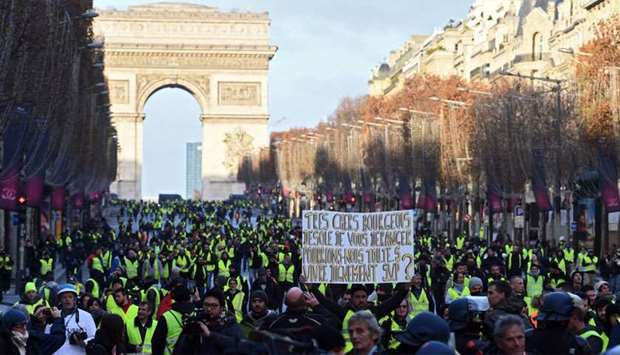Paris police detained nearly 300 people Saturday ahead of fresh anti-government ‘yellow vest’ protests which authorities fear could turn violent for a third weekend in a row.
Clad in their luminous road safety jackets, dozens of demonstrators -- who accuse President Emmanuel Macron of only looking out for the rich -- gathered at dawn on the Champs-Elysees, the scene last Saturday of the worst rioting in Paris for decades.
‘We had to come to Paris to be heard,’ said protester Herve Benoit, arriving with three friends from the Dordogne in western France.
He called on the government to boost people's spending power and increase taxes on the wealthiest.
By 8.40 am (0740 GMT) police had already detained 278 people.
Some 8,000 police were deployed, carrying out checks on people arriving at train stations and at protest hotspots such as the Champs-Elysees and Bastille monument.
A source close to the operation told AFP that at least 34 people were arrested for carrying masks, hammers, slingshots and rocks that could be used to attack police.
Shops, museums, the Eiffel Tower and many metro stations were closed as much of the city-centre went on effective lockdown. Top-flight football matches and concerts were cancelled.
Last weekend's violence, which saw some 200 cars torched and the Arc de Triomphe vandalised, shook France and plunged Macron's government into its deepest crisis so far.
Interior Minister Christophe Castaner said he expected ‘only a few thousand people’ to descend on Paris after the 8,000 protesters counted last weekend, ‘but among them are ultraviolent individuals’.
‘These past three weeks have produced a monster that its creators no longer control,’ Castaner said, vowing ‘zero tolerance’ towards those aiming to wreak further destruction.
Prime Minister Edouard Philippe on Friday evening met a delegation of self-described ‘moderate’ yellow vests who have urged people not to join the protests.
After the meeting a spokesman from the movement, Christophe Chalencon, said Philippe had ‘listened to us and promised to take our demands to the president’.
‘Now we await Mr Macron. I hope he will speak to the people of France as a father, with love and respect and that he will take strong decisions,’ he said.
Philippe said some 89,000 police were being mobilised nationwide, with a dozen armoured vehicles deployed in Paris for the first time in decades.
- 'Keep a low profile' -
Shops around the Champs-Elysees boulevard boarded up their windows and emptied them of merchandise on Friday, while the Louvre, Musee d'Orsay and other museums were shut.
Department stores were also staying closed due to the risk of looting on what would normally be a busy shopping weekend in the run-up to Christmas.
Foreign governments are watching developments closely in one of the world's most visited cities.
The US embassy issued a warning to Americans in Paris to ‘keep a low profile and avoid crowds’, while Belgium, Portugal and the Czech Republic advised citizens planning to visit Paris over the weekend to postpone their visit.
In a warning of impending violence, an MP for Macron's party, Benoit Potterie, received a bullet in the post on Friday with the words: ‘Next time it will be between your eyes.’
Calls on social media for protesters to attack the police or march on the presidential palace have especially rattled the authorities.
- Increasingly radicalised -
Macron this week gave in to some of the protesters' demands for measures to help the poor and struggling middle classes, including scrapping a planned increase in fuel taxes and freezing electricity and gas prices in 2019.
But the ‘yellow vests’, some of whom who have become increasingly radicalised, are holding out for more. Many are calling on Macron to resign.
The protesters began blocking roads, fuel depots and shopping centres around France on November 17 over soaring petrol prices that have hit people in the provinces who get around by car.
Since then the movement has snowballed into a wider revolt against former investment banker Macron.
Protests at dozens of schools over university reforms, and a call by farmers for demonstrations next week, have added to a sense of general revolt.
The hardline CGT union, hoping to capitalise on the movement, has called for rail and metro strikes next Friday to demand immediate wage and pension increases.
- 'President of the rich' -
Macron's decision early in his presidency to slash taxes on France's wealthiest is particularly unpopular with the protesters.
Arguing that such a move was necessary in order to boost investment and create jobs, he has so far ruled out re-imposing the ‘fortune tax’.
But the policy, along with hikes on pensioners' taxes, cuts in housing allowances and a string of comments deemed insensitive to ordinary workers, has led critics to label him a ‘president of the rich’.
Macron had previously vowed to stay the course in his bid to shake up the French economy and not be swayed by mass protests that have forced previous presidents to back down.
His U-turn on higher fuel taxes -- which were intended to help France transition to a greener economy -- marks a major departure.

